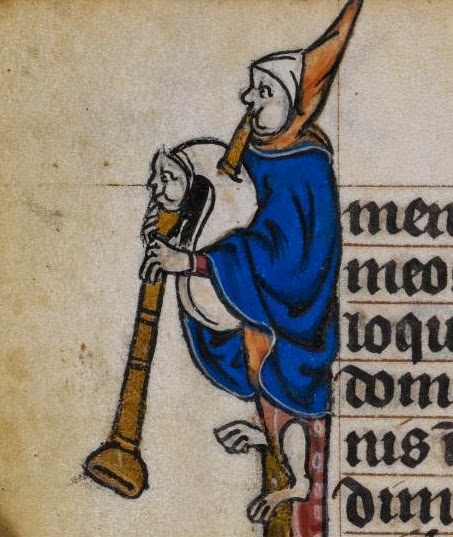
Word of the Day Piper
Today’s word of the day, again thanks to the Old English Wordhord website, is piper. A piper is someone who plays a pipe. The Old English is pipere (/ˈpiː-pɛ-rə/ or pee peh ruh), and it means the same thing as the ModE word. It is called an “agent noun from pipe” (https://www.etymonline.com/search?q=piper). According to Wikipedia, “an agent noun (in Latin, nomen agentis) is a word that is derived from another word denoting an action, and that identifies an entity that does that action. For example, driver is an agent noun formed from the verb drive. Usually, derived in the above definition has the strict sense attached to it in morphology, that is the derivation takes as an input a lexeme (an abstract unit of morphological analysis) and produces a new lexeme” (https://en.wikipedia.org/wiki/Agent_noun). In other words, the verb (pipe) takes on an affix (-r) and forms a new word (piper). The -r suffix is frequently used in English to create an agent noun from a verb.
According to etymonline, the verb pipe appears as “Old English pipian ‘to play on a pipe’ or similar instrument, from Latin pipare ‘to peep, chirp,’ of imitative origin (see pipe (n.1)). Compare Dutch pijpen, German pfeifen.” There are lots of other cognates in other Germanic languages.
Today is, of course, the 11th day of the Christmas season, which means, according to the “12 Days of Christmas,” the day when the receiver gets eleven pipers piping. The “12 Days of Christmas” is an old English folk song or carol coming out of the oral tradition. A folk song, or anything that is legitimately “folk” in origin,” has certain characteristics: there is no identifiable author, it exists in multiple versions, and it comes out of the oral tradition. This first published version of this song is from the eighteenth century.
The English librarian and folklorist Steve Roud indexed English folk songs according to a number of characteristics. Each folk song was given a number, called a Roud number, along with all the variants of that song. “12 Days of Christmas” is Roud #68. The type of folksong is called a cumulative song, with each verse adding something to the total. Here is a partial list of some of the variations that have appeared over the years, courtesy of Wikipedia:
- In the earliest versions, the word on is not present at the beginning of each verse—for example, the first verse begins simply “The first day of Christmas”. On was added in Austin’s 1909 version, and became very popular thereafter.
- In the early versions “my true love sent to me” the gifts. However, a 20th-century variant has “my true love gave to me”; this wording has become particularly common in North America.
- In one 19th-century variant, the gifts come from “my mother” rather than “my true love”.
- Some variants have “juniper tree” or “June apple tree” rather than “pear tree”, presumably a mishearing of “partridge in a pear tree”.
- The 1780 version has “four colly birds“—colly being a regional English expression for “coal-black” (the name of the collie dog breed may come from this word). This wording must have been opaque to many even in the 19th century: “canary birds“, “colour’d birds”, “curley birds”, and “corley birds” are found in its place. Austin’s 1909 version, which introduced the now-standard melody, also altered the fourth day’s gift to four “calling” birds, and this variant has become the most popular, although “colly” is still found.
- “Five gold rings” has often become “five golden rings”, especially in North America since the 1961 recording by Mitch Miller and The Gang. In the standard melody, this change enables singers to fit one syllable per musical note.
- The gifts associated with the final four days are often reordered. For example, the pipers may be on the ninth day rather than the eleventh.
Personally, I cannot imagine anyone sending or giving me eleven pipers piping. But it’s often hard to understand the context of folk songs.
The image today is a photo of a page in The Maastricht Hours, which “is a book of hours that was produced in the vicinity of Liège early in the 14th century and is now among the Stowe manuscripts of the British Library” (https://en.wikipedia.org/wiki/Maastricht_Hours).